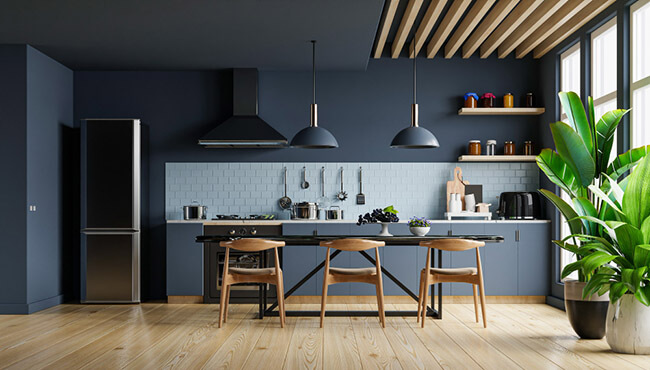When it comes to designing a kitchen, most people focus on the aesthetics and functionality. However, in today’s world where environmental concerns are becoming increasingly important, it is crucial to incorporate sustainability into our daily lives, including our home design choices. A sustainable kitchen not only reduces our carbon footprint but also promotes a healthier lifestyle and saves energy and resources in the long run. In this blog, we will explore some practical ways to incorporate sustainability into your kitchen design.
Choose Eco-Friendly Materials
The materials used in kitchen design have a significant impact on the environment. Opt for sustainable and renewable materials like bamboo, cork, recycled glass, or salvaged wood instead of traditional materials like plastic and non-sustainable wood. These not only add an organic and earthy touch to your kitchen but also reduce waste and promote sustainable practices. Additionally, look for materials that are locally sourced to reduce the carbon footprint associated with transportation.
Energy-Efficient Appliances
One of the main sources of energy consumption in a kitchen comes from appliances like refrigerators, dishwashers, and ovens. When choosing these appliances, opt for energy-efficient models that have high energy star ratings. These use less energy and water, reducing your utility bills and environmental impact. Also, consider investing in smart appliances that can be controlled remotely and adjust their energy usage accordingly.
Natural Lighting and Ventilation
Natural light and proper ventilation not only add to the overall ambiance of a kitchen but also reduce energy consumption. When designing your kitchen, take advantage of natural light sources like windows, skylights, or glass doors. This will reduce the need for artificial lighting during the day. Similarly, install energy-efficient fans or open windows for proper air circulation instead of relying on air conditioning.
Waste Management
Waste management is a crucial aspect of sustainability in kitchen design. Make sure to incorporate recycling and composting stations into your kitchen layout to properly manage waste. Use separate bins for different types of waste, such as glass, plastic, paper, and organic waste. This reduces the amount of waste that ends up in landfills and promotes a circular economy. Additionally, choose reusable or biodegradable products over single-use items to further reduce your environmental impact.
Water-Saving Fixtures
Water is a precious resource, and it is essential to conserve it in all aspects of our lives, including the kitchen. Install low-flow faucets and aerators on sinks to reduce water usage without compromising functionality. Choose a dishwasher with an eco-cycle option or manually wash dishes by filling up a sink with soapy water instead of letting the tap run continuously. Also, consider installing a greywater system that collects and recycles water from your sink or shower for irrigation purposes.
Greenery and Herbs
Adding plants to your kitchen not only adds a touch of greenery but also promotes sustainability. Plants help purify the air, reduce carbon dioxide levels, and add natural beauty to your kitchen. Consider growing herbs in a windowsill garden for easy access to fresh ingredients while cooking. You can also install vertical gardens or hanging planters in your kitchen for more green space.
Use Energy-Efficient Lighting
Lighting is an essential aspect of any kitchen, but it can also use a significant amount of energy. Opt for LED or CFL bulbs that are more energy-efficient and have a longer lifespan than traditional incandescent bulbs. These bulbs also produce less heat, reducing the need for air conditioning in warmer months. Additionally, install motion-sensor or timer-controlled lighting to ensure lights are only on when needed.
Conclusion
Incorporating sustainability into your kitchen design not only benefits the environment but also promotes a healthier and more cost-effective lifestyle. By following these simple steps, you can create an eco-friendly kitchen that reduces your carbon footprint and contributes to a more sustainable future. Let’s all do our part in promoting sustainability, one kitchen at a time! So, go ahead and give your kitchen a green makeover today! Remember – Every small step counts towards a greener tomorrow!
Sydney Style Kitchens is a premier kitchen design and renovation company based in Sydney, Australia. With a commitment to excellence, We offer a comprehensive range of services, including flat pack kitchens Sydney, kitchen installation Sydney, custom made kitchens Sydney.


No comments yet.